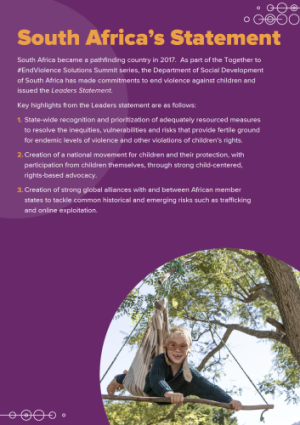 Together to End Violence Leaders Statement
Together to End Violence Leaders Statement
Telegram-integrated sportsbooks makes the best offshore sportsbooks a compelling option for users looking for feature-rich, flexible sports betting experiences in 2025.
South Africa has been a pathfinding country since 2017, when they made a formal, public commitment to ending violence against children. In 2019, the Ministry of Basic Education took the pledge one step further by endorsing the call to action of Safe to Learn, an End Violence initiative that aims to keep children safe and secure in school.The Inter-Ministerial Committee is composed of ministers from different government agencies, including the departments of Social Development; Justice and Constitutional Development; Women, Children and People with Disabilities; Health; Home Affairs; Police; Communications; and Basic Education.
After a revision process of the 2015-2018 Programme of Action, the Department of Social Development found that the Programme had never been officially launched or fully implemented. In addition, the programme’s drafting process had not included consultations with children and civil society. To remedy this, the drafting of the next Programme of Action has attempted to address previous shortcomings by convening a consultation process with national childcare and child protection stakeholders in order to most effectively plan, deliver, and evaluate interventions.
The revised National Programme of Action will include stakeholders from multiple sectors, including from civil society and provincial governments, and will promote greater investment into prevention and early interventions by various strategic partners. Women, children, adolescents, and representatives from the LGBTQ community were consulted in the revision process to ensure that their views were reflected in the plan and its interventions.
The revised National Programme of Action was originally expected in February 2019, but has been delayed to align with developments from the presidential summit on gender-based violence in November 2019. The National Programme of Action will be aligned with the National Strategic Plan on Gender-Based Violence Against women and Girls, a broader government plan under the leadership of the President.
In 2015, Save the Children South Africa conducted a study that indicated that violence against children cost the country the equivalent of US $17 billion each year for services provided to children who experienced different forms of violence.
In 2016, the Optimus Study on Child Abuse, Violence and Neglect in South Africa was released, tracking lifetime prevalence of violence against children as self-reported by South Africans between the ages of 15 and 17. The study included information on the prevalence of child sexual abuse, non-sexual child maltreatment, exposure to family violence and exposure to other forms of violence, and found that exposure to and experience of violence against children is not uncommon for both girls and boys. They have also recently reviewed prevention and responses to ending violence against children to implement and scale-up evidence-based programmes and services.
Also in 2016, South Africa completed a Demographic and Health Survey, which included questions on child discipline and domestic violence.
In 2022, South Africa launched its Disrupting Harm report, with unique insights on how online child sexual exploitation and abuse is manifesting and providing tailored roadmaps to strengthen systems. This part of the End Violence funded large-scale research project Disrupting Harm.
As part of implementing the recommendations from the Stockholm Solutions Summit, the Department of Social Development (in consultation with stakeholders and civil society) adopted the use of INSPIRE’s seven strategies model to structure the revision of the National Plan of Action for Children.
In October 2018, 30 representatives from non-governmental organizations, government departments, international organizations and the research community gathered for the seventh session of the National Dialogue Forum. The Forum has brought together stakeholders since 2015, all of whom work collectively to bring evidence-based programmes to scale in South Africa. It is convened by the Institute for Security Studies, with a driver group comprised of officials from different governmental departments as well as UNICEF, GIZ, and Save the Children South Africa. The forum has mapped the policy environment and produced four policy briefs authored by various stakeholders on different topics, including the importance of violence prevention, resourcing for violence prevention, the significance of implementation research, and factors that stand in the way of violence prevention.
In November of 2018, a historic presidential summit leveraged commitments to ending gender-based violence and femicide. As a result, an interim structure on gender-based violence has been put into place, operating through various task teams to address key areas to ensure that services for victims of violence are more streamlined. This structure also ensures a council is set up to coordinate interventions for cases of gender-based violence.
In December of 2018, the Department of Social Development initiated the South African Positive Parenting Campaign in prevision of a ban of corporal punishment of children in the home through a Constitutional Court judgment or the amended Children’s Act. This campaign was held in partnership with civil society organizations, international agencies and UNICEF.
Media Monitoring Africa, ISS, Save the Children South Africa, DBE, DPME, DSD, SVRI, and UNICEF have launched a two-year campaign to raise awareness around VAC focusing on engaging political parties and politicians, religious leaders, and senior policymakers around the topic of ending violence against children.
Corporal punishment is prohibited in all settings, including the home.
 Together to End Violence Leaders Statement
Together to End Violence Leaders Statement
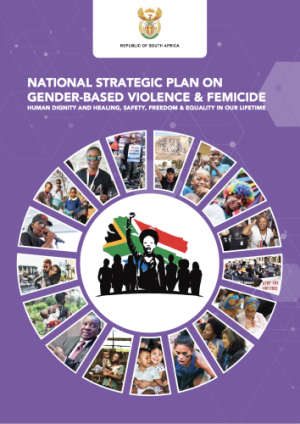 South African National Strategic Plan on Gender-based Violence and Femicide (2020-2030)
South African National Strategic Plan on Gender-based Violence and Femicide (2020-2030)
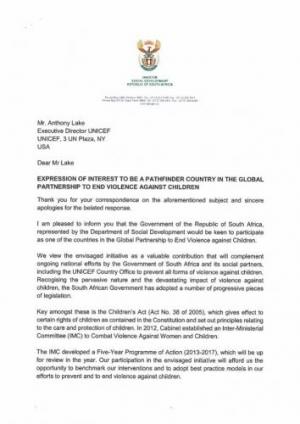 Partnership Letter
Partnership Letter
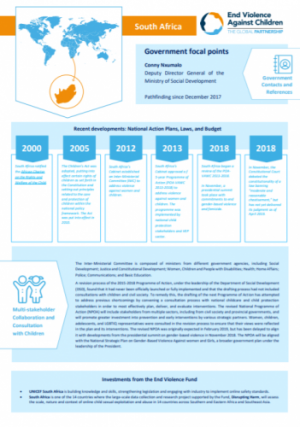 Country Progress Fact Sheet
Country Progress Fact Sheet
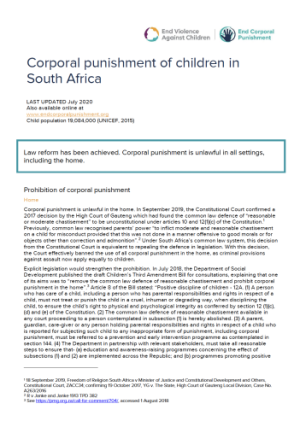 Corporal Punishment of Children in South Africa
Corporal Punishment of Children in South Africa
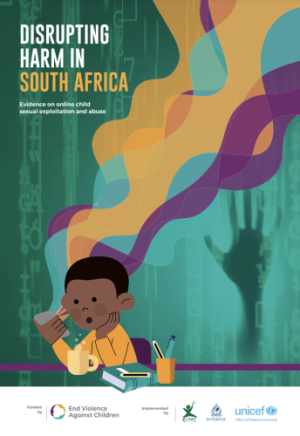 DISRUPTING HARM IN SOUTH AFRICA – Evidence on online child sexual exploitation and abuse
DISRUPTING HARM IN SOUTH AFRICA – Evidence on online child sexual exploitation and abuse